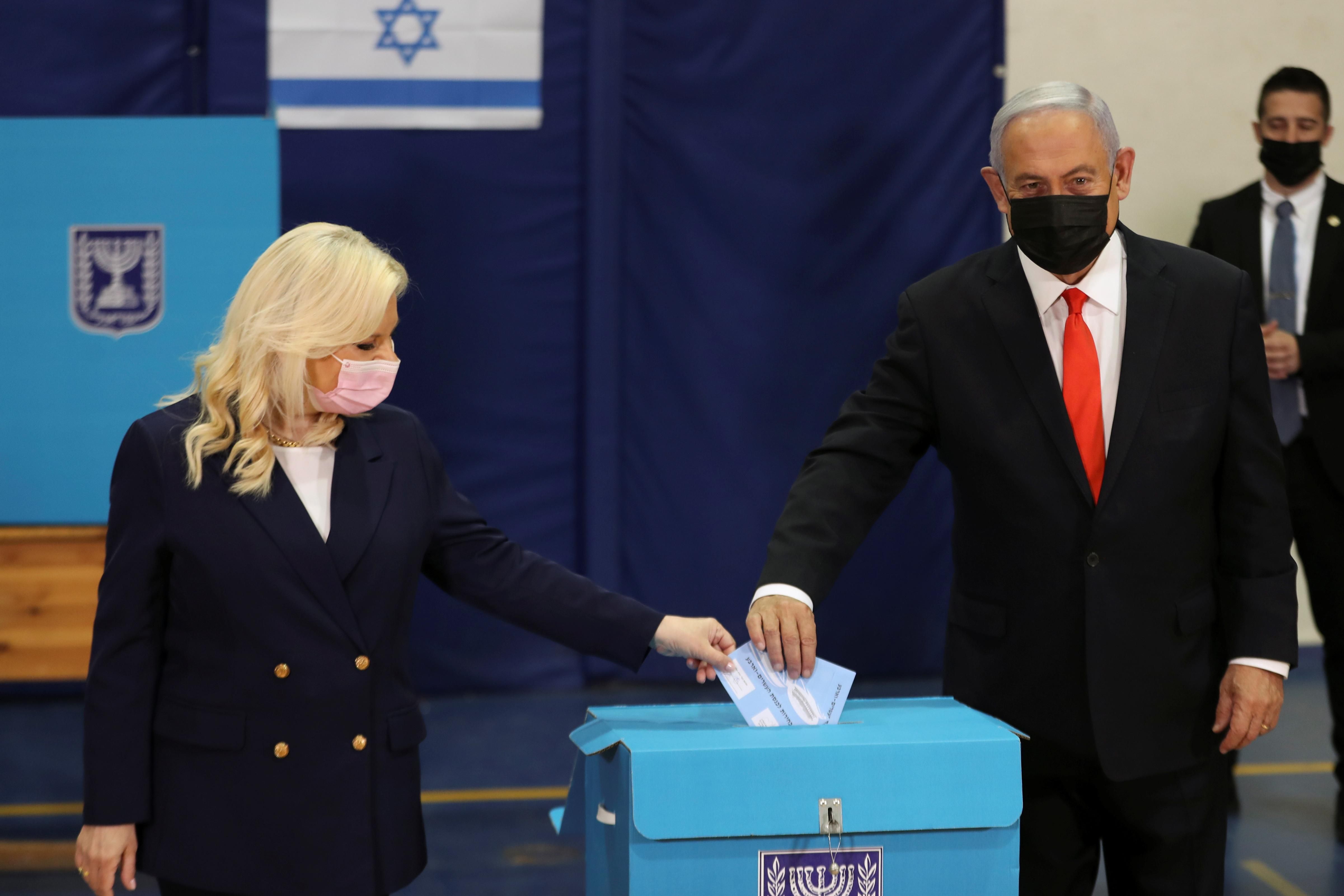It's an all-too familiar dance in Israel by now: politicians campaign, activists canvass, and the public laments another draining and inconclusive election. Rinse repeat.
Now for the fourth time in just two years, Israelis have voted in general elections. The polls are closed and the votes are being tallied. With 88 percent of votes now counted, what do we know so far and what are the possible outcomes?
It's a nail-biter. Polls from all major television networks predict incumbent Prime Minister Benjamin "Bibi" Netanyahu's Likud party will win the most parliamentary seats (about 30 out of 120). That was expected. But in order to retain the top job Bibi needs to hammer together a coalition that would hold a 61 seat majority, a tricky task for the divisive political giant. While Netanyahu has secured the backing of an alliance of ultra-Orthodox and Jewish ultra-nationalist parties — which includes extremist anti-LGBTQ candidates and a far-right anti-Arab faction — Bibi's pathway to 61 seats is extremely tenuous. While he needs the backing of his former protégé Naftali Bennett, whose right-wing Yamina (Rightwards) party reaped around six seats, it wont be enough to get him across the finish line. In order to form a majority coalition, the incumbent now needs to broaden his alliances beyond the far-right camp.
A massive development at the eleventh hour. The Ra'am party, an Islamist faction, passed the Knesset threshold, winning around five seats. That puts the party's leader, Mansour Abbas, in the unlikely position of "kingmaker" — a rarity in Israel's right-leaning political milieu. Abbas has not declared support for either Netanyahu or the anti-Bibi bloc. Either way, this development significantly diminishes Netanyahu's path to 61 seats.
How did other hopefuls do? The Yesh Atid (We have a future) party's Yair Lapid — the centrist candidate leading the anti-Bibi bloc — is slated to win roughly 17 seats, an underperformance according to pre-election polls. More concerning for Lapid, however, is that smaller parties whose support he would need to form a viable anti-Netanyahu coalition got obliterated at the ballot box. It was a particularly embarrassing night for Gideon Sa'ar, a one-time Netanyahu ally who defected from Likud last year and formed the New Hope party. New Hope is likely to finish up with a measly six parliamentary seats. (Sa'ar also hired consultants from the now disgraced Lincoln Project in the US to aid his campaign. Clearly, their services did not pay off.)
Low voter turnout. After three previous elections failed to break the current stalemate, it is not surprising that Israelis have lost confidence in the electoral system. While voter turnout was down across the board — 67.2 percent, the lowest since 2009 — the dip was particularly stark among eligible Arab Israelis, 37 percent of whom voted, down from 43.3 percent in March 2020. As a result, the Joint List, a coalition of Arab parties, is slated to win just six seats in the next Knesset, down from 15. This is a big blow for the anti-Netanyahu camp, which is counting on the moderate Arab coalition to boot Netanyahu from office.
Half a million "double envelope ballots" to count: Absentee ballots trickling in from soldiers and diplomats always take longer to count. But this time because of the COVID pandemic, there are roughly 600,000 "double envelope ballots" — representing 8 percent of all eligible voters — to be counted from ad hoc polling sites. It will take several days for these votes to be counted, and could certainly sway the final outcome. At the time of this writing, at least 450,000 of these ballots remain to be counted.
Will there be a fifth election? This is looking more likely. Even if Netanyahu manages to pull together a razor-thin edge, he may decide that a one-seat majority government would give too much power to extremists within his ranks and would be unstable. He could then choose to undermine the negotiations in the hopes of doing better next time. After all, Netanyahu wants most of all to form a stable government that can help him avoid an ongoing corruption trial.
Additionally, even if the anti-Bibi parties prevail, reaching a combined 61 seats, the loose alliance of Jewish secular, Jewish far-right, Islamist, and Jewish left-wing factions may be too unwieldy to sit in government together.
Patience is a virtue. Seasoned political analysts urged caution on Tuesday night, saying that during the last election in March 2020, exit polls overstated the Netanyahu camp's advantage and path to victory. That has already proven to be true. At this stage, it doesn't seem like the divided Knesset, which hasn't passed a national budget in three years, is likely to stabilize anytime soon. And given the ideological diversity within the two camps, a dreaded fifth election is appearing more likely.
More For You
America’s new National Security Strategy confirms what Europeans have feared for months: Washington now sees a strong, unified European Union as a problem to be solved, not an ally to be supported.
Most Popular
The power of sports
What’s Good Wednesdays™, December 10, 2025
Walmart's $350 billion commitment to American jobs
In this episode of Tools and Weapons, Microsoft Vice Chair and President Brad Smith sits down with Ed Policy, President and CEO of the Green Bay Packers, to discuss how purpose-driven leadership and innovation are shaping the future of one of the world’s most iconic sports franchises. Ed shares how technology and community-focused initiatives, from Titletown Tech to health and safety innovations on the field, are transforming not just the game of football, but the economy and culture of Green Bay itself. He explains how combining strategic vision with investment in local startups is keeping talent in the Midwest and creating opportunities that extend far beyond Lambeau Field.
Subscribe and find new episodes monthly, wherever you listen to podcasts.
More than a week after Hondurans cast their ballots in a presidential election, the country is still stuck in a potentially-dangerous post-election fog.
